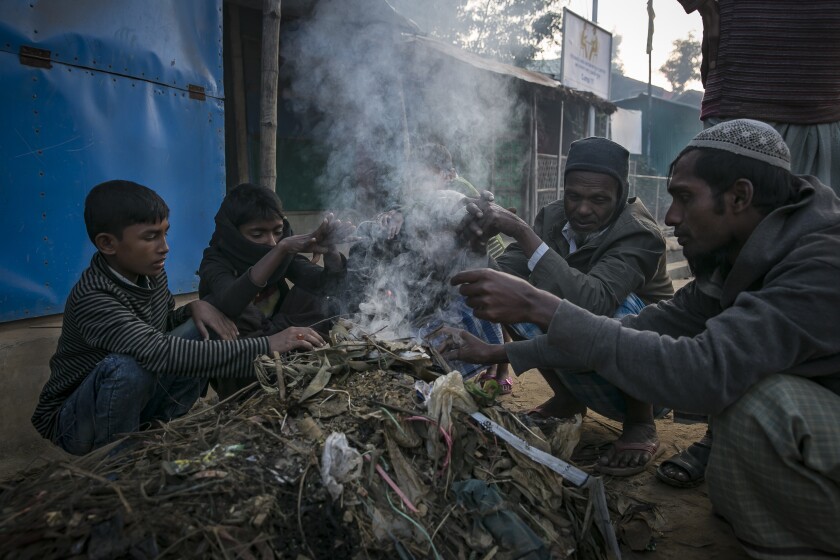The global crisis we’re forgetting about — 71 million people displaced by war and unrest
Rohingya refugees from Myanmar warm themselves by a fire at a refugee camp in Cox’s Bazar, Bangladesh.
(Allison Joyce / Getty Images)
March 13, 2020
3 AM
The world faces a humanitarian crisis of historic proportions — and one that doesn’t involve the coronavirus. Over the last decade, global displacement of people from their homes due to war or political instability has grown from about 44 million to more than 71 million, which the United Nations High Commissioner for Refugees says far surpasses the estimated 60 million people displaced by World War II.
Much of that sudden growth is the result of the horrific Syrian civil war, which has sent 6.7 million people — roughly the population of Washington state — fleeing their homes, many of them squatting in the neighboring nations of Lebanon, Jordan and Turkey. And that doesn’t include most of the 800,000 people who fled Idlib Province in recent months as Turkish and Syrian forces (with Russian help) waged war in northern Syria.
But it is not just Syria. Millions of people have also fled violence and instability in northern and sub-Saharan Africa, including 2.3 million people uprooted in civil-war-torn South Sudan alone. Afghanistan, where the U.S. has been mired in war for a generation, accounts for another 2.7 million displaced people.
Anti-Muslim policies in Buddhist-dominated Myanmar have uprooted more than 1 million Rohingya, mostly from Rakhine state, many of them now living in squalor in neighboring Bangladesh. Corruption, economic hardship (propelled in part by climate change) and deadly gang activity in Central America have sent hundreds of thousands of people fleeing. The economic meltdown and political crisis in Venezuela dating back to Hugo Chavez’s rise to power in 1999 has similarly pushed an estimated 4 million people out of the country.
Such massive displacements create not only humanitarian problems, but also political ones. The uprooting of people around the Mediterranean has put particular stress on Turkey, which hosts some 4.1 million refugees; Germany, with about 1 million refugees; and Italy and Greece, which serve as points of first arrival for most of the flow of humanity. Nationalism fanned in part by the refugee displacements has propelled far-right political movements in Hungary, Austria, Italy and elsewhere in Europe. Donald Trump tapped into fear of immigrants to win the presidency four years ago, and is banking on the issue to help his reelection bid in November.
So what’s the answer to this crisis, which has gone on for so long it has become accepted as part of the global backdrop? More countries accepting more refugees for permanent resettlement is necessary, including the United States, where the Trump administration has essentially shut the door to most refugees. Robust funding of relief efforts is crucial, but difficult. The U.N. refugee office estimates it needs about $8.6 billion a year to address the crisis but receives only about half of that in donations, primarily from the United States, the European Union and about a dozen individual countries and private and institutional donors.
But stabilizing at-risk countries and regions to keep people from fleeing in the first place is crucial. Bolder and stronger international leadership to mediate peace agreements in conflict areas would help. In Central America it has long been recognized that a more robust and inclusive economy, a clampdown on corruption, effective criminal-justice systems and responsive democratic institutions would go a long way toward alleviating many of the push factors.
But those problems and their solutions have been known for years, and despite sporadic efforts by the U.S. and other regional governments, results have been mixed, according to a November report by the Congressional Research Service.
Unfortunately, these crises are only going to get worse, according to experts — driven by climate change that is making parts of the world too hot for human life, exacerbating droughts, changing where crops can be grown and intensifying floods and storms. The world has tried to craft plans to address global warming, including the 2015 Paris agreement, but the best efforts have turned out to be woefully insufficient, a problem worsened by President Trump’s dangerous decision to withdraw the U.S., and his adoption of policies aimed at increasing the production and use of fossil fuels.
The refugee crisis is one we’re inflicting upon ourselves, with wars, destabilizing regional power politics, racism, religious intolerance and xenophobia, and our collective failure so far to marshal the necessary resources to save the global environment from the human activities that cause climate change. We have no one but ourselves to blame — and yet only we can solve the problems. We’d best get at it, and quickly, before the human condition worsens.

Comments
Post a Comment